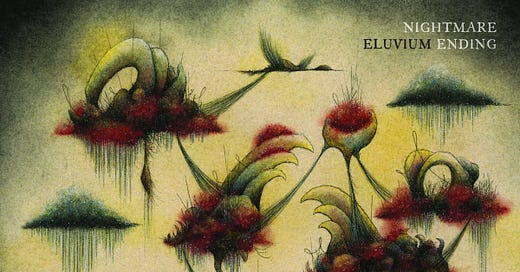Welcome back to Drumming Upstream! This is the last week of our detour into ambient music before I need to shift my focus for research for my upcoming trip to Seattle, where I’ll be attending and writing about Northwest Terror Fest. Hopefully by the time I make it back to the east coast my new snare drum will be on the way and the “drumming” part of this series will be relevant again.
Last week I used Tim Hecker’s “Virginal II” to show how even ambient music that bucks the genre’s conventions can’t escape the marginalizing effect of streaming. This week I’d like to try the opposite. Instead of taking a piece of prickly, discomforting ambient music and reducing it to background music, I’d like to take a piece of genuinely pretty ambient music and rescue it from the system that seeks to banalize it. Can I pull it off? Only one way to find out!
“Covered in Writing”1
By Eluvium
Nightmare Ending
Released on May 14th, 2013
Liked on December 7th, 2015
Though his music is often repetitive, Matthew Cooper rarely repeats himself. Over the five albums that led up to Nightmare Ending, Cooper’s work under the name Eluvium took a range of shapes, from solo piano to drone, synth chamber orchestras to ambient pop. Don’t mistake this flexibility for facelessness, though. No matter what shape his compositions take, Cooper’s work strikes the same chord and plucks at the same heartstrings. Picture the afternoon sun shifting patterns through a blanket of leaves, filtered through curtains waving gently in the breeze. Cooper’s music is the sound the light would make if silence weren’t already a perfect score. It is a cool glass of water on a hot day, a comfy seat after a day of standing up, it is the sound of letting the tension fall out of your shoulders and the score to letting yourself stop keeping score.
The only exception is Static Nocturne, Cooper’s fifth and the album that directly proceeded today’s subject. Nocturne, a nod to the influence of Frederic Chopin, is appropriately a darker affair. While his chord choices and melodies remain the same, Static Nocturne frames the music with howling wind and rustling noise. Taken on its own the album is an impressive piece, one of the better Eluvium records if you ask me, but in the context of Cooper’s career it feels more like a sonic slate cleaner. Cooper released Static Nocturne in 2010. Earlier that same year he released Similes, the first Eluvium album to feature Cooper’s singing. Critics and fans received this foray into vocals with muted positivity. Cooper would probably admit that he’s no great singer, and while his understated approach doesn’t detract from the compositions on Similes it doesn’t add much to them either. The experiment was worth a shot, but the results didn’t warrant further study. These two records, the bold innovation of Similes and Static Nocturne’s Etch-A-Sketch-shaking reset, were written and released after Cooper began and then abandoned the material that ended up on Nightmare Ending. It wasn’t until he got these two experiments out of the way that Cooper returned to this unfinished work and polished it up for public consumption.
I’m telling you all of this in such a chronologically confusing way because listening to Nightmare Ending bends time. The album is long, two discs on CD and 83 minutes in total. Putting it on stops the clock in its tracks. Those 83 minutes don’t so much pass as linger over each other. Most of my favorite albums are arranged in a way that momentum from one track carries into the next. Nightmare Ending by design has no such momentum. The goal isn’t to move from point A to point B, but to slow down and notice the non-alphabetical points between. Nightmare Ending also bends the progression of Cooper’s body of work back into itself. The record combines bits and pieces from each of the previous Eluvium albums, almost like a reverse engineered greatest hits collection. Even though its length might be daunting to first-timers, no algorithm or editorial team could cook up a better introduction to Cooper’s work than Nightmare Ending. Do you prefer the lucid solo piano pieces like “Caroling”? Then check out An Accidental Memory in the Case of Death. The tense distortion of “By The Rails” tickle your fancy? Sounds like Static Nocturne is the one for you. And if you were gobsmacked by the track “Covered In Writing”, well, welcome to the winner’s circle, and grab yourself a copy of Talk Amongst The Trees.
“Covered in Writing” is a nine minute long composition born out of a single 19 second long phrase. For the whole of the track this melody, half mournful half hopeful, turns over on itself without ever resolving. The song is open-ended but never invites in a rejoinder. All that changes is how Cooper dresses up this central phrase, playing it on piano or filtering it through a dense fog of synthesizers. The song starts in a state of formlessness, rising slowly out of silence as if opening its eyes from sleep. Nearly three minutes later Cooper gives the melody definition by moving it to the piano, filling out the harmony in the process. Here again time is confounded. The song only seems to begin in a conventional sense after you’ve already heard where it’s going, and its climax, the moment five minutes in where the piano fades and the melody returns to the synths, only brings us back to the song’ pre-history.
A few years after releasing Nightmare Ending Cooper zeroed into the time-negating aspects of his work on an album called Shuffle Drones. Shuffle Drones is a 12 minute 43 second long record split into 23 chunks. The album is designed to be listened to on shuffle, so that the track order is randomized, and on repeat, so that the album never conclusively ends. As Cooper puts it in the song-titles-as-artist-statement: “the intent is to create a body of work specifically designed for and in disruption of modern listening habits.” What I take this to mean is that the album’s unending cyclicality2 is designed specifically to fit into Spotify’s business model, not for artists, but for the platform itself. Spotify’s goal, like any tech company of its size, is to monopolize your time and attention. The longer you use the service, and the less time you use a competitor’s, the better. An album that never ends then is the ideal product for a streaming platform. Put it on, forget its playing, and let Spotify hoover up your data.
If we are to free “Covered in Writing” from streaming, we must fight the urge to hear the song as a loop. Instead of treating it a cycle we must hear it linearly, as a song that begins and ends at discrete points in time. We must learn to anticipate its progression from beginning to end and celebrate the markers between. The key I believe comes almost five minutes into the song, roughly halfway along its trajectory. The piano has just faded out. The melody briefly imperceptible behind a shimmering wall of reversed sounds, as if the song is holding its breath, waiting for something to happen. And then it happens. The melody swells back in and then swells further. The notes ring out as if they’d freed themselves from the physical instruments that created them. They float onward, upward, and gradually out of sight. This moment is beautiful because it does not repeat. To appreciate it is to anticipate it, bask in it, and then let it fade away. Looping “Covered in Writing” strangles this beauty out of it until its arc flatlines. Pleasant dreams must end too.
DRUMMING UPSTREAM LEADERBOARD
You know, it just occurred to me that I could have called this segment the “liederboard”. Is there a German word for the regret you feel when you miss out on a good pun? Anyway, I think this track rocks. It’s easily my favorite piece of music from Eluvium. The moment this letter hinged on really does give me a euphoric kick in the pants every time I hear it. To me “Covered in Writing” masterfully handles both sides of the ambient music equation. It rewards both passive and active listening. It just so happens that it rewards active listening more. For now Eluvium’s single contribution to Drumming Upstream will sneak its way into the top 5.
“Covered In Writing” by Eluvium
As I mentioned up top, next week I’m taking a break from Drumming Upstream, but I will return with another letter. The week after that I’ll likely have to take off since I’ll be out of town, briefly on vacation, and then on a deadline. We’ll see where I stand after that. Thanks for reading!
I’m sorry, I need to get this out of the way now. Every time that I read this song title my brain dredges up a clip from the X-Men cartoon from the early 90s where a Morlock convinces Wolverine that he’s “cOvErEd WiTh ScOrPiOnS”. If Spotify existed when I was a child I would have smashed the living hell out of the Like button on X-Men’s opening theme.
I’m sure there’s a distinct number of ways that the 23 tracks can be re-organized but I’m speaking practically here. I’ll let the real math heads sort out the rest out on their own.




